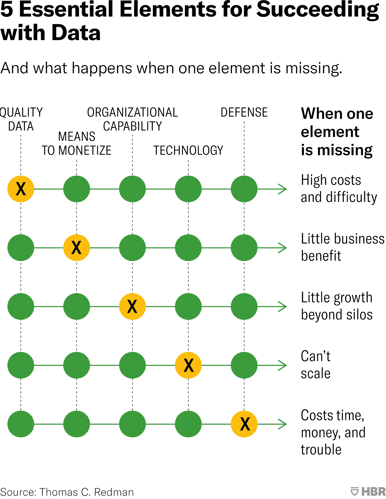Data is the driving force behind technological progress and the foundation of data-driven organizations. From artificial intelligence to predictive analytics, data has become the key to unlocking valuable insights and gaining a competitive edge in the market. However, not all data is equal, and ineffective data can significantly hinder technological progress and derail even the most well-thought-out strategies.
Ineffective data refers to inaccurate, incomplete, or inconsistent information that does not accurately represent reality. This can include duplicate records, outdated information, or incorrect formatting. With the sheer volume of data being generated daily, it is estimated that up to 25% of all data organizations use is considered ineffective.
One way in which ineffective data hampers technological progress is by slowing down decision-making processes. Having accurate and reliable data is essential in a fast-paced business environment where real-time decisions are crucial for success. When faced with wrong or incomplete information, organizations may struggle to make informed decisions promptly, resulting in missed opportunities and setbacks.
Moreover, ineffective data can lead to faulty analysis and inaccurate insights. Data analysts are critical in identifying patterns and trends from vast information. However, if they are working with poor-quality or misleading data sets, their findings will be flawed and could potentially lead companies down the wrong path.
Another significant impact of ineffective data on technological progress is its effect on automation systems. As more businesses turn towards automation for efficiency gains and cost savings, accurate, high-quality data input becomes crucial for these systems' proper functioning. Wrong inputs can disrupt automated processes, leading to costly errors that affect productivity.
Organizations must prioritize data quality management practices to avoid the detrimental effects of bad data. This includes regularly cleansing and validating data, implementing strict data entry protocols, and investing in data monitoring tools to detect potential issues. By prioritizing the quality of their data, organizations can ensure that they are making informed decisions based on reliable insights, thus driving successful technological progress.
Essential Elements for Succeeding with Analytics Projects
Certain essential elements must be in place for analytics projects to succeed. These elements act as the backbone of any data strategy; without them, it would be difficult to achieve meaningful results. This section will delve deeper into these crucial elements and explain why they are essential.
Quality Data:
The first and most fundamental element for succeeding with data is quality data. Analytics projects involve analyzing different data types – from customer information to financial records. Therefore, the accuracy and reliability of the data are paramount. Without high-quality data, wrong insights may lead you down the wrong path and result in incorrect conclusions.
It is essential to have systems that ensure proper data collection processes are followed, and all information is recorded correctly. This includes having clean databases free from duplicates or errors. Additionally, regular audits should be conducted to identify any potential issues with the quality of the collected data.
Means to Monetize:
While quality data is essential for analysis purposes, it also needs a clear purpose – which brings us to our second crucial element for success: the means to monetize. This refers to understanding how your organization can leverage the valuable insights from analyzing the collected data.
Data analyst, not just to provide accurate findings but also to suggest ways in which those findings can be translated into tangible benefits for the organization – whether through increasing revenue or optimizing processes.
Organizational Capability:
Data can exist in silos; it needs organizational capability behind it to make an impact. This involves a strong team of professionals who know how best to utilize available resources and effectively implement changes based on insights from the analyzed data.
Additionally, a culture that values and promotes data-driven decision-making is crucial for organizational capability. This includes regular communication channels where data insights can be shared and training programs to help employees understand how to use data in their day-to-day work.
Technology:
In today's digital age, technology plays a significant role in succeeding with data. Technology enables us to handle and process enormous amounts of data efficiently and effectively, from data collection tools to sophisticated analytics software. As a data analyst, having the necessary technical skills and staying updated on the latest technological advancements is essential.
Defence:
One cannot talk about succeeding with data without addressing the element of the defense. With cyber-attacks becoming increasingly common, organizations must prioritize cybersecurity measures when handling sensitive and valuable information. It is essential for data analysts to understand security protocols and have contingency plans in place to mitigate any potential risks.
How does missing one of the elements affect an organization

Image Source: Thomas C. Redman
- Quality data is the foundation for any successful analysis or decision-making. Any insights gained will be flawed, potentially leading to incorrect conclusions without accurate and reliable data. Missing this element can waste time and resources on futile analysis, ultimately hindering an organization's progress.
- Means to monetize refers to the ability to generate value from the analyzed data. This can take various forms, such as identifying cost-saving opportunities, revenue-generating ideas, or even improving customer experience. Organizations may struggle to see tangible benefits from collecting and analyzing data without this element.
- Organizational capability refers to having the necessary skills, processes, and culture to handle and utilize large amounts of data effectively. This includes training skilled employees in handling complex datasets and implementing efficient data management methods. A lack of organizational capability can lead to miscommunication, disorganization, and a lack of direction when utilizing valuable insights from collected data.
- Technology is another vital element that is essential for success with data as a data analyst. Access to advanced tools such as analytics software or cloud computing enables organizations to process vast amounts of information quickly and accurately. Organizations may struggle with efficiency and accuracy when dealing with large datasets without proper technology infrastructure.
- The final element discussed is defense, which refers to security measures for protecting sensitive information. As more companies rely on digital systems to store and analyze data, robust defense mechanisms against cyber threats have become increasingly essential. In today's world, where privacy concerns are at an all-time high, missing this crucial element could have severe consequences for an organization and its reputation.
The absence of these elements can significantly affect an organization's ability to succeed with data. Organizations must assess their strengths and weaknesses in each of these areas and work towards building a solid foundation for successful data analysis. By carefully considering and addressing these crucial elements, organizations can create a robust strategy that utilizes data effectively and drives success.
You May Also Like
These Related Stories

Business Analysis - A Leadership Perspective

Your Ultimate Guide to Securing Entry-Level Data Analyst Jobs


No Comments Yet
Let us know what you think